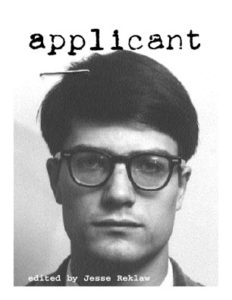Applicant by Jesse Reklaw, reviewed!
 We ask every intern to write a review of one of our books. Dane chose Jesse Reklaw’s Applicant. Here’s what he made of it:
We ask every intern to write a review of one of our books. Dane chose Jesse Reklaw’s Applicant. Here’s what he made of it:
I once had a roommate who told me that he simply didn’t like me as a person. This isn’t the sort of thing people say to one another, and for good reason. That level of honesty is more than hurtful. It is existentially threatening. One really cutting opinion from a trusted source can throw you, or at least me, straight back to an adolescent tailspin. Have you ever looked into your own eyes, late at night in the bathroom mirror, and whispering, asked yourself as honestly as you know how, “What the fuck?” This is Applicant.
In Applicant, earnest portraits of students are juxtaposed with the backhanded assessments of their professors and employers, people they trusted, spent countless hours with, looked up to. “Lack of personal discipline” reads the confidential recommendation under the portrait of a beefy grad student. Me too, brother. Next to a clean cut young man: “Somewhat too concerned with himself.” Which, if you have to ask.
The savagery is disturbing in the best way. This is the perfect book to leave on the back of your toilet if you’d like to introduce your guests to the horror of the void in the middle of their business. It is like looking through other people’s medicine cabinet. It’s like walking a mile in your sad-eyed uncle’s saggy BVDs. It is engrossing and strange but you will be glad you can leave whenever you need to. Reading Applicant is not unlike watching a pack of gazelles being ripped down by tweed-clad cheetahs. Part of me wants the naively hopeful gazelle to get away unharmed. Another part of me loves the spectacle of their demise.
But Applicant is more than absurdist-horror. The glimpses into the inner sanctum of 70s old-boy academia elevate this little pamphlet into read-out-loud-at-parties hilarity. Women are revealed to be on the brink of hysteria, if not childbirth. “Miss M___ is a black woman,” begins one assessment so fraught that, like fine art, it defies true analysis. I find myself wondering whether it is unbecoming to enjoy this as much as I do. Certainly to the people involved, there is nothing funny here, least of all to the hysteric young grad students apparently strewn about the Ivy League. I hope they never come across this book. One can only speculate what condition their nerves are in after all those children.
Fortunately, time and anonymity declaw the savagery. Whatever happened to these students has happened and they have made it or not, and the professors are all dead or retired and their prejudices are on the way out. The hope and pain and potential devastation are all safely in the past. Does that make it better to laugh at these people? But then I’m not laughing, at least not anymore. Instead I lean in, look each of them deep in the eyes and whisper, “What the fuck? What the fuck?”